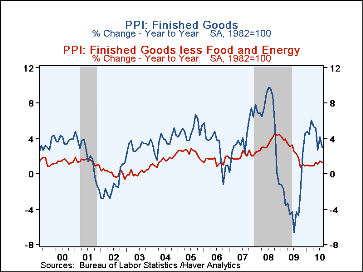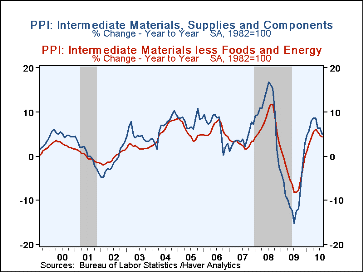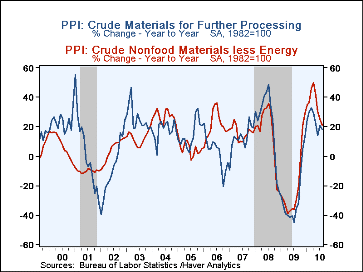 Global| Sep 16 2010
Global| Sep 16 2010Producer Prices Jump With Higher Energy Costs; Core Prices Are Tame
by:Tom Moeller
|in:Economy in Brief
Summary
The August producer price index for finished goods turned in its strongest gain since March with a 0.4% increase following a 0.2% July rise. Nevertheless, the y/y increase eased to 3.0% since the comparison was to strong gains this [...]
 The August producer price index for finished goods
turned in its strongest gain since March with a 0.4% increase following a
0.2% July rise. Nevertheless, the y/y increase eased to 3.0% since the
comparison was to strong gains this time last year. The monthly rise was
slightly above Consensus expectations for 0.3%. Strength in the overall
m/m readings did not, however, apply to core pricing power. The PPI less
food & energy inched up an expected 0.1% but the y/y gain of 1.3% was
nearly double that of last October.
The August producer price index for finished goods
turned in its strongest gain since March with a 0.4% increase following a
0.2% July rise. Nevertheless, the y/y increase eased to 3.0% since the
comparison was to strong gains this time last year. The monthly rise was
slightly above Consensus expectations for 0.3%. Strength in the overall
m/m readings did not, however, apply to core pricing power. The PPI less
food & energy inched up an expected 0.1% but the y/y gain of 1.3% was
nearly double that of last October.
Strength in finished energy prices was behind the elevated August increase. A 2.2% gain was driven by a 1.7% increase in gasoline prices (7.0% y/y) and a 5.7% rise (12.2% y/y) in home heating oil costs. Natural gas prices inched up just 0.5% (5.3% y/y) and electricity costs rose 0.5% (5.0% y/y). Offsetting some of this strength was weakness in food prices which fell 0.3%. Lower fresh & dried vegetable prices led the decline with a 4.1% drop (+11.7% y/y) while beef prices fell 1.6% (+10.0% y/y) for the third consecutive month of decline. To the upside, pork prices jumped 1.9% (31.3% y/y) and dairy prices rose 0.9% (14.7% y/y).
Core finished consumer goods prices inched up just 0.1% last month (1.9% y/y). That 12-month gain is down sharply from 3.0% last year and 3.8% in 2008. Weaker gains in apparel prices account for some of the deceleration while furniture prices also were weak. Passenger car and appliance prices actually fell. Capital equipment prices ticked up just 0.1% last month (0.4% y/y).
Intermediate goods pricing power improved, but by just a bit. The 0.3% August increase followed declines during the prior two months. Intermediate energy prices rose 1.3% but the y/y gain decelerated to a still-strong 8.2%. That strength was, however, accompanied by a lesser 0.9% (3.4% y/y) increase in food prices and a modest 0.1% gain in core-intermediate prices. Crude goods pricing also improved, but for different reasons. Last month's strong 2.3% increase reflected a 3.5% (16.6% y/y) jump in food prices. Crude energy prices ticked up just 0.5% (18.2% y/y) but that followed a 4.5% spike in July. Reflecting strength in the industrial sector, core crude prices also were quite firm and posted a 4.1% (21.1% y/y) jump. That reflected a 9.5% spike (28.0% y/y) in copper scrap prices and a 4.1% (34.0% y/y) jump in iron & steel scrap prices.
The PPI data are contained in Haver's USECON database, with further detail in PPI and PPIR.
How Ridged Are Producer Prices? from the Federal Reserve Bank of New York is available . here.
| Producer Price Index (%) | August | July | June | Year Ago | 2009 | 2008 | 2007 |
|---|---|---|---|---|---|---|---|
| Finished Goods | 0.4 | 0.2 | -0.5 | 3.0 | -2.5 | 6.4 | 3.9 |
| Energy | 2.2 | -0.9 | -0.5 | 7.8 | -17.6 | 14.1 | 6.8 |
| Food | -0.3 | 0.7 | -2.2 | 3.8 | -1.4 | 6.8 | 6.6 |
| Less Food & Energy | 0.1 | 0.3 | 0.1 | 1.3 | 2.6 | 3.4 | 2.0 |
| Intermediate Goods | 0.3 | -0.4 | -0.9 | 5.0 | -8.4 | 10.3 | 4.0 |
| Less Food & Energy | 0.1 | -0.4 | -0.4 | 4.2 | -4.2 | 7.4 | 2.8 |
| Crude Materials | 2.3 | 2.7 | -2.4 | 18.2 | -30.3 | 21.4 | 11.9 |
| Less Food & Energy | 4.1 | -1.4 | -4.8 | 21.1 | -23.5 | 14.8 | 15.6 |
Tom Moeller
AuthorMore in Author Profile »Prior to joining Haver Analytics in 2000, Mr. Moeller worked as the Economist at Chancellor Capital Management from 1985 to 1999. There, he developed comprehensive economic forecasts and interpreted economic data for equity and fixed income portfolio managers. Also at Chancellor, Mr. Moeller worked as an equity analyst and was responsible for researching and rating companies in the economically sensitive automobile and housing industries for investment in Chancellor’s equity portfolio. Prior to joining Chancellor, Mr. Moeller was an Economist at Citibank from 1979 to 1984. He also analyzed pricing behavior in the metals industry for the Council on Wage and Price Stability in Washington, D.C. In 1999, Mr. Moeller received the award for most accurate forecast from the Forecasters' Club of New York. From 1990 to 1992 he was President of the New York Association for Business Economists. Mr. Moeller earned an M.B.A. in Finance from Fordham University, where he graduated in 1987. He holds a Bachelor of Arts in Economics from George Washington University.
More Economy in Brief
 Global| Feb 05 2026
Global| Feb 05 2026Charts of the Week: Balanced Policy, Resilient Data and AI Narratives
by:Andrew Cates








